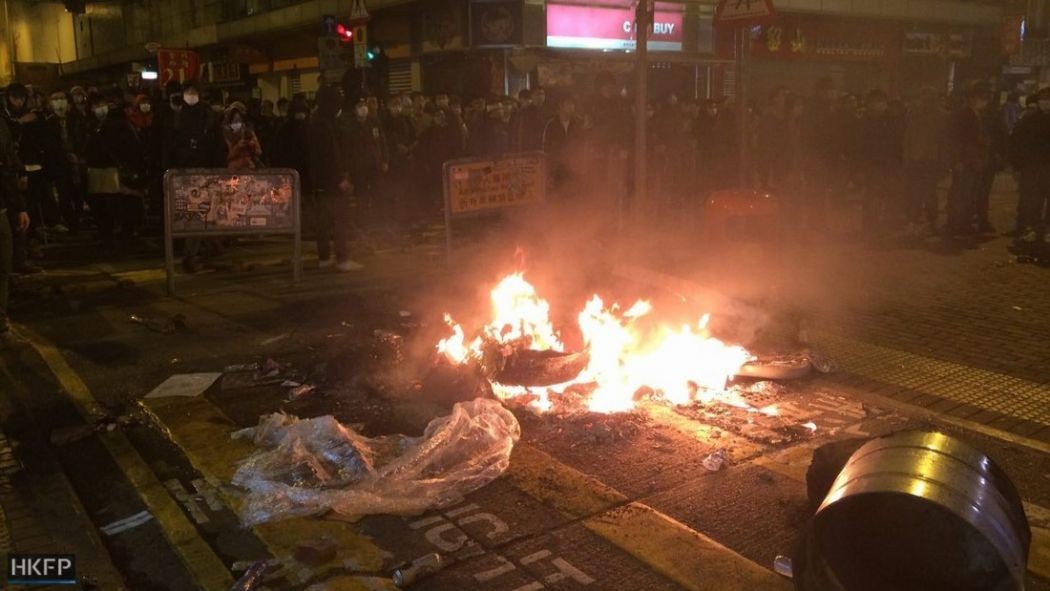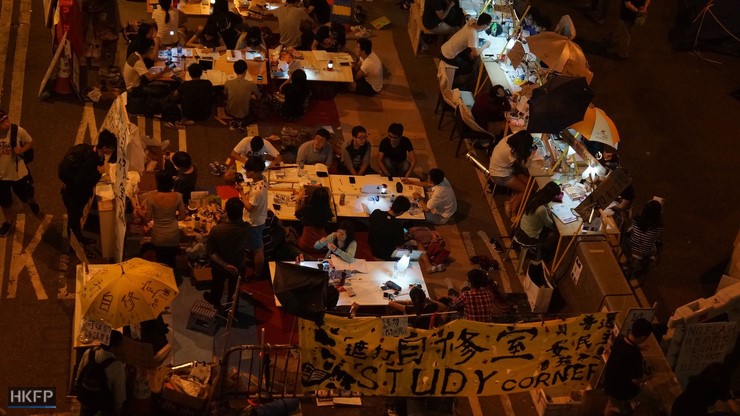By Taylor Wong, Progressive Lawyers Group.
On the first day of the Lunar New Year, Hong Kongers watched in shock as a series of unfamiliar images unfolded on their screens: a policeman firing two gunshots, burning tyres, and masked men hurling bricks. Such aggression – from civilians as well as police – was unseen on local soil since the 1967 leftist riots.
Hopefully, such an escalation of violence was a one-off event. However, the fact is that the incident was merely a reaction – albeit an unusually aggressive one – to a drawn out, ongoing war that pro-establishment powers have been waging against ordinary Hong Kong citizens: the war to suppress calls for democracy, to quash local culture and customs, and to silence public dissent against those powers.

Stories of Hong Kong’s local culture, values, and way of life being chipped away are proliferating beyond our capacity to count. To name just a few recent headlines: the disappearance of the Causeway Bay booksellers, Alibaba’s purchase of the South China Morning Post, and the Arthur Li HKU Council debacle.
It was against that backdrop that the Mong Kok protest initially began: as a localist campaign to protect street hawkers, who in recent years have endured harsh clampdowns during the public holiday (in previous decades, public health officers would generally turn a blind eye in acknowledgment of the local festival tradition).
It is clear that this war over the very soul of the city is being fought on many fronts. The latest battle in the spotlight is one waged over the minds of Hong Kong’s future generations – through language.

Last December, the Education Bureau announced a proposal for renewing the curriculum of local schools. On the question of the subject of Chinese, the bureau proposed to teach students from Primary 1 to Form 6 how to read simplified Chinese (purportedly, only after they had mastered traditional Chinese). The objectives outlined within the proposal were particularly eye-catching, including: to support exchanges and improve communications between Hong Kong people and Mainland people; cultivate students’ national identity (that is to say, a ‘greater Chinese identity’ in contrast to a ‘Hong Konger identity’); and foster their affection for the motherland (no, I am not making this up).
The proposal seems innocuous enough; after all, if students know how to read simplified Chinese, they can consume texts in simplified Chinese, which would complement their Mandarin studies. However, when considered with other factors, it is obvious that this proposal is part of the ‘Sinofication’ policy of Hong Kong’s local education system and its pupils. Consider the suggestions made in the proposal regarding the area of “Personal, Social and Humanities Education”: it advocates removing key topics in the curriculum such as “the importance of justice in society” and “the scope and function of local society”, and replacing them with topics like “the importance of rules and complying with the Basic Law”.

Although teaching students to identify simplified Chinese characters would not threaten the dominant position of traditional Chinese, at least in the short term (and the city’s lingua franca of Cantonese), the proposal is rightly viewed with great suspicion by educators, parents, and pro-democracy groups. The Education Bureau’s blatant suggestion to remove topics that foster civic responsibility while adding ones that explicitly nurture national identity appears to be a clear political manoeuvre. The fact that the level of trust between citizens and government is at its lowest point in years only makes it worse.
Political considerations aside, teaching students how to read simplified Chinese is not sound policy from a practical standpoint. First, Mandarin has been a core subject in local primary and secondary schools since 1998/99, and simplified writing is taught in that subject. Second, as Professor Shek Kam Tse (a Chinese language teaching expert at HKU) has explained, most students begin reading simplified Chinese texts by Primary 5, and since simplified Chinese “can be easily picked up after reading a few times”, adding simplified Chinese reading to the curriculum is unnecessary. Third, as Legislative Council President Jasper Tsang pointed out, the current proposal lacks detail in terms of how it will be effectively implemented. Without actually determining how the programme would be taught and how students will be assessed, it is no wonder that the proposal has elicited negative reactions.
Therefore, even if we ignore the cultural and historical arguments that support the idea of traditional Chinese writing as inherently superior to simplified (e.g. the argument that traditional writing represents the pinnacle of Chinese culture while simplified writing was only adopted in the Mainland in the 1950s to improve the literacy rate) teaching students how to identify simplified Chinese is a redundant exercise. The Bureau’s resources would be better spent on addressing far more pressing issues, such as the Territory-wide System Assessment (TSA) debacle and the implementation of the Chief Executive’s promise of free kindergarten education.

Language, in its spoken and written forms, is the cornerstone of every community’s culture. It not only shapes how people speak, but how they think. Given the actual and perceived encroachments of Mainland cultural practices over those in Hong Kong, any government proposal that may upend the dominant position of traditional Chinese writing and Cantonese would inevitably be met with denigration and scepticism. If the comparatively trivial cultural symbol of street hawkers could trigger the actions and emotions we saw in Mong Kok, I shudder to imagine the consequences if the government attempts to force Hong Kongers to surrender one of the most important and symbolic characteristics of the city’s soul.
Taylor Wong is a legal eagle who likes to think, observe, and write about social issues, but still occasionally wishes to become a professional cat whisperer.
